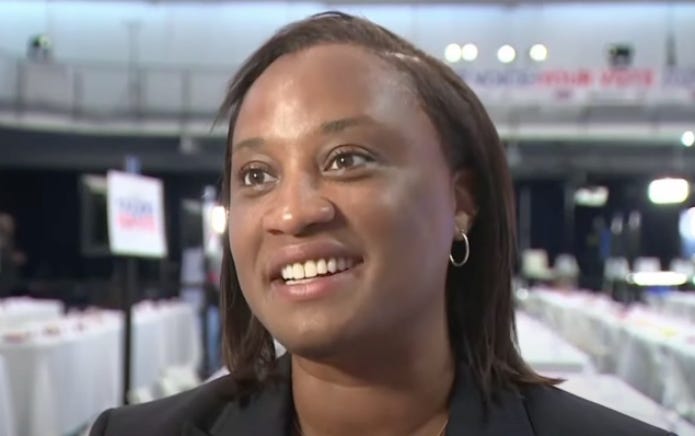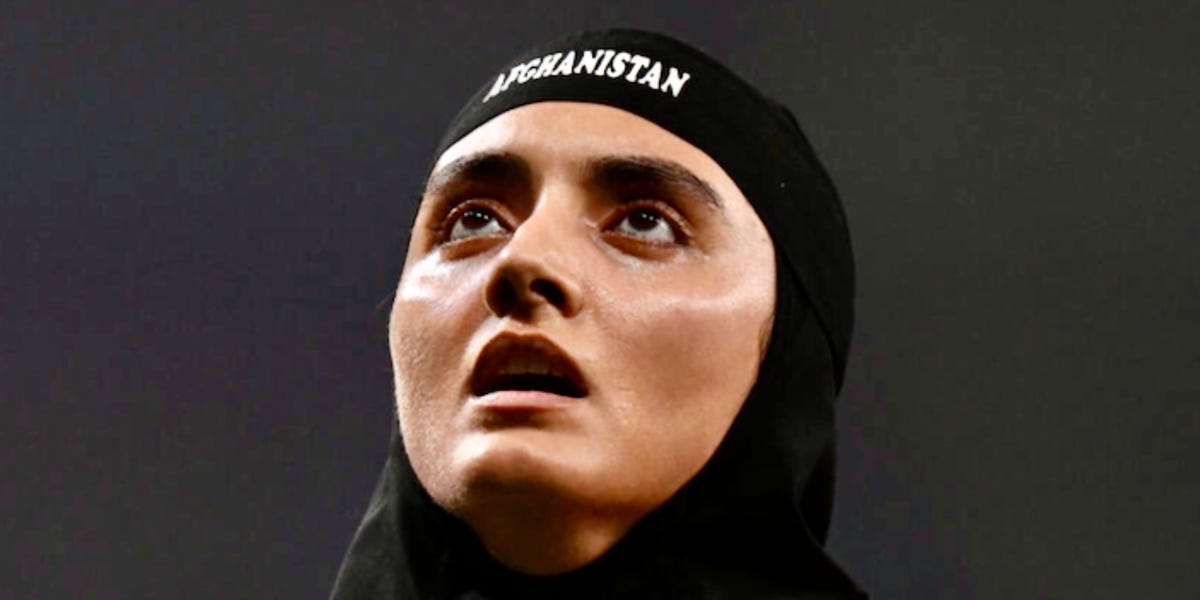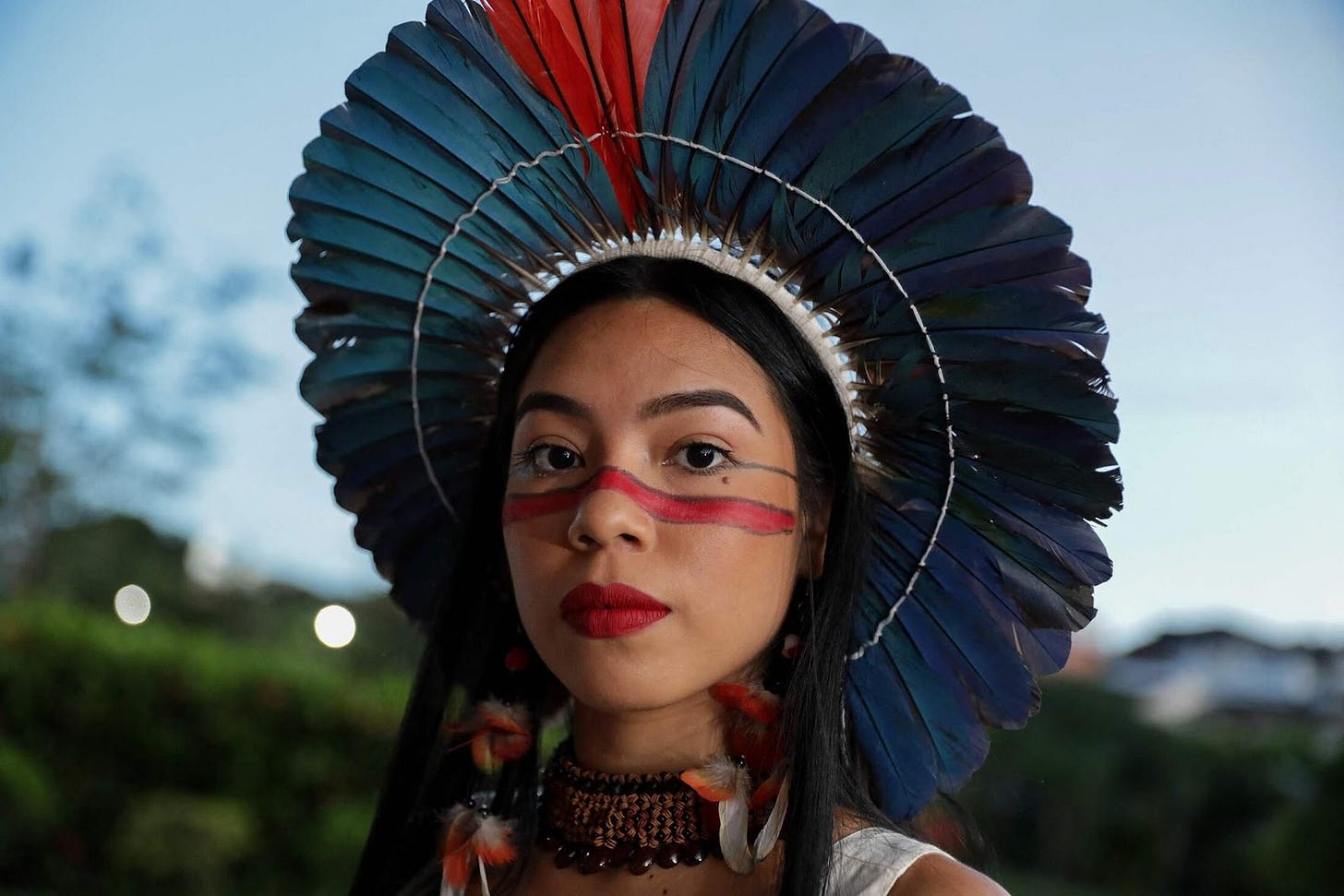Global Roundup: Pakistani Architect Rebuilding Homes, First Black Lesbian Woman in US Congress, Poet from Sweden’s Gang Wars, Afghan Woman’s Message at Asian Games, Brazilian Indigenous Fashion
Curated by FG Contributor Inaara Merani
A woman in a sustainable shelter built with the design of Pakistan architect Yasmeen Lari. Photo: Handout
Pakistan’s first certified woman architect, Yasmeen Lari, is helping villagers in southeastern Pakistan rebuild their homes that were ruined in the unprecedented floods last year. Rather than building concrete homes that are expensive and high in carbon emissions, or rebuilding the traditional mud huts that were washed away, Lari’s houses were designed to be disaster-resilient, environmentally friendly, and quickly and easier to build.
Last year, the floods destroyed around 1.4 million homes and killed over 1700 people. Thus far, Lari has built around 1,000 homes in the Sindh province using local materials such as lime, mud, and bamboo. The houses take only one week to build, compared to around three weeks for mud huts and up to two months for permanent cement homes. Each home can be built for under $87, which is less than one tenth of the cost of cement structures.
The 82-year-old architect used to design modern, glamorous buildings such as hotels, office buildings, and government headquarters; Lari had typically used concrete, glass and steel, but she turned to sustainable relief architecture in 2005 after an earthquake devastated Kashmir. She established an NGO to help survivors of natural disasters in Pakistan to build 55,000 homes, 4,500 of which were built since the floods started last June. Her goal is to provide homes for at least 350,000 households.
Lari’s designs resemble traditional village architecture in Pakistan, known as chauhras, but the simple exteriors mask the innovative designs that incorporate indigenous building techniques from rural Pakistan, re-engineered to be more sustainable and to stop flooding. The prefabricated bamboo structures sit on raised platforms, and have lime-hardened mud walls that keep out water. The roofs are made of bamboo and are covered with straw matting, a layer of tarp, and pozzolana, a waterproofing material. Lime absorbs carbon dioxide from the air, and bamboo isolates carbon as it grows, making these homes extremely durable and good for the environment.
As the impacts of climate change continues to devastate communities around the world, creative solutions like Yasmeen Lari’s demonstrate that the world can combat climate change and protect themselves if we turn towards sustainable methods of building, as well as indigenous practices.
(Gay Times)
Butler was sworn into the Senate on Tuesday afternoon and she will hold the seat for the remainder of the term through 2024. Although she has been appointed in an interim capacity, Butler plans on running for re-election next year.
No one will ever measure up to the legacy of Sen. Dianne Feinstein, but I will do my best to honour her legacy and leadership by committing to work for women and girls, workers and unions, struggling parents, and all of California. – Senator Laphonza Butler
In addition to her new role as Senator, Butler is also the president of EMILY’s List, an organization that works to elect democratic pro-choice women to office that fight for women’s rights and communities. She also previously led strategic campaigns for Hillary Clinton.
Faysa Idle has lost her eldest brother and a close friend. (The Guardian)
Faysa Idle is the sister of a leading Swedish gang member and she always felt like she had a target on her back. Due to her brother’s position, she was banned from entering certain neighborhoods and she constantly felt frightened. She always felt like she could not leave her family and her home, but when her safety was really put into danger, she found the strength to walk away.
In 2020, Idle and her siblings each had a price of 100,000 krona, or 7500 British pounds, on their heads. They all narrowly escaped after being watched and almost attacked by gang members. Sweden is just now coming to terms with this past September being the deadliest month of shootings since records began in 2016, and Idle has chosen to speak up about her experiences, as well as gun violence and how it is destroying families, especially women, and communities.
Idle used poetry to convey her emotions and feelings, and to discuss women’s oppression in Sweden, especially Black women’s oppression. Her words and pictures have been featured across national newspapers and radio stations after her book was published, and due to the recent uprise in violence, her voice has been very prominent in the national conversation.
Creating this book came with risk and danger. Speaking out publicly and breaking the code of silence, especially as a woman, put her life in extreme danger. Idle had to break away from everything she knew to start a new life. She now lives in a new area and has limited contact with old acquaintances.
I don’t know what the consequences are of this but I know that we have already lived the consequences for a long time. We have already lived in misery. I am very, very courageous. And I am a woman who is tired. – Faysa Idle
Afghanistans Kimia Yousofi at the Asian Games © WILLIAM WEST / AFP. (France 24)
Last year, Kimia Yousofi fled persecution from her homeland, Afghanistan, and moved to Australia. After uprooting her life and resettling, she was able to participate in sprinting at the Asian Games. Yousofi says that she was present at the Games to represent all Afghan girls’, in defiance of the Taliban’s rule.
When the Taliban returned to power in 2021, women’s sports were effectively banned. Although women cannot participate in sports within the country, women living outside of Afghanistan have been able to participate in sporting competitions around the world, with the help of overseas sports bodies.
The 27-year-old athlete carried Afghanistan’s flag at the Tokyo Olympics two years ago, and also competed in the first round of the women’s 100m in Hangzhou. Although she finished last in the race, she said that there was a bigger meaning at play; she was representing all the Afghan women and girls who do not have the permission to play sports and whose rights are still being challenged.
Since resettling in Australia last year, Yousofi has had the opportunity to work on herself and her sport. To be an Afghan woman competing in such a competitive and athletic sport overseas takes bravery and resilience. Yousofi’s example demonstrates how seemingly small acts of defiance have the biggest impacts.
I had many problems, but on the other side, Afghan girls they don’t have permission for education, work, sports…I can’t do anything, just keep going. – Kimia Yousofi
Indigenous women in Brazil’s capital, Brasilia, showcased their clothing creations during a fashion show at the Third March of Indigenous Women. The purpose of this fashion show was for women to claim their rights, as well as for the demarcation of Indigenous lands.
The Brazilian models wore headdresses, necklaces, and other traditional attire, strutting down a runway with green foliage. Typically in Brazil, it is not common to see an Indigenous fashion show, so this event set a precedent for Brazilian Indigenous women moving forward.
Today we showed the power of our creation in clothing…our headdresses and our ancestry. We participate in politics when we sing and parade. – Célia Xakriabá
Federal lawmaker Célia Xakriabá said that the event was all about decolonizing fashion. Last year, Xakriabá was voted in during the October elections, at the same time that Bolsonaro was defeated. Brazil’s new president, Luis Inácio Lula da Silva has significantly given Indigenous peoples in Brazil more exposure and access to resources and other necessities. Since he was elected, eight Indigenous territories were demarcated, and he created the country’s first Ministry of Indigenous Peoples, led by Indigenous woman Sonia Guajajara.
Indigenous men had visibility, but now women are adding their strength to the defense of their territory too. They are marching to say ‘we are here’ and it’s no longer possible to keep ignoring us. – Ana Paula da Silva, researcher at Rio de Janeiro State University’s Indigenous peoples study program
Inaara Merani (she/her) recently completed her Masters degree at the University of Western Ontario, studying Gender, Sexuality, and Women’s Studies with a specialization in Transitional Justice. In the upcoming years, she hopes to attend law school, focusing her career in human rights law.
Inaara is deeply passionate about dismantling patriarchal institutions to ensure women and other marginalized populations have safe and equal access to their rights. She believes in the power of knowledge and learning from others, and hopes to continue to learn from others throughout her career.










